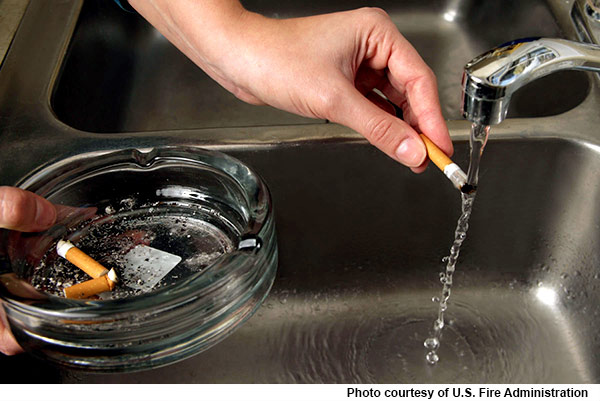Even though smoking among adults has been on a steady decline since 1965, smoking is still a major cause of home fire deaths in the United States, according to the United States Fire Administration. If you smoke – or live with a smoker – use caution when handling smoking materials, such as cigarettes, pipes, cigars, matches and lighters, to keep you and your family safe.
The U.S. Centers for Disease Control and Prevention has tracked adult smoking from a high of 42 percent of adults in 1965 to just 12.5 percent in 2020. This reduction is attributed to increased public awareness regarding the health risks associated with smoking, concerns for clean air and state or municipal laws that limit smoking in public places.
As of 2016, one in 20 (5%) of home structure fires were started by smoking materials. These fires caused almost one in four (23%) home fire deaths, and one in 10 (10%) home fire injuries, not counting any firefighter deaths or injuries, according to the National Fire Protection Association.
The USFA and NFPA offer these tips to prevent fires caused by smoking materials:
- If you smoke, think about quitting
- If you smoke, consider switching to fire-safe cigarettes, which have a reduced ignition strength and are less likely to cause a fire
- When you smoke, smoke outside
- Use deep, wide ashtrays placed on a sturdy surface indoors and a can filled with sand outdoors
- Extinguish all smoking materials (cigarettes, pipes, cigars, etc.) prior to leaving the room or area
- Soak cigarette butts and ashes in water before throwing them into the trash
- Check under furniture cushions for cigarette butts that may have fallen out of sight
- Stay alert! Don’t smoke in bed, and put out cigarettes if you are feeling drowsy
- Make sure working smoke alarms are properly installed on every level of your home to alert you in case of fire
- Use dual-sensor smoke alarms that detect both a flame-driven fire and a smoky fire that produces fumes without flames
- Never smoke in a home where medical oxygen is in use
- Keep matches and lighters out of the reach of children
Smokers who would like to quit can find Quit Smoking tips from the CDC.
The United States Fire Administration offers Home Fire Safety Tips for Smokers.
The National Fire Protection Association offers additional research on Smoking and Home Fire Safety.
This loss control information is advisory only. The author assumes no responsibility for management or control of loss control activities. Not all exposures are identified in this article.

